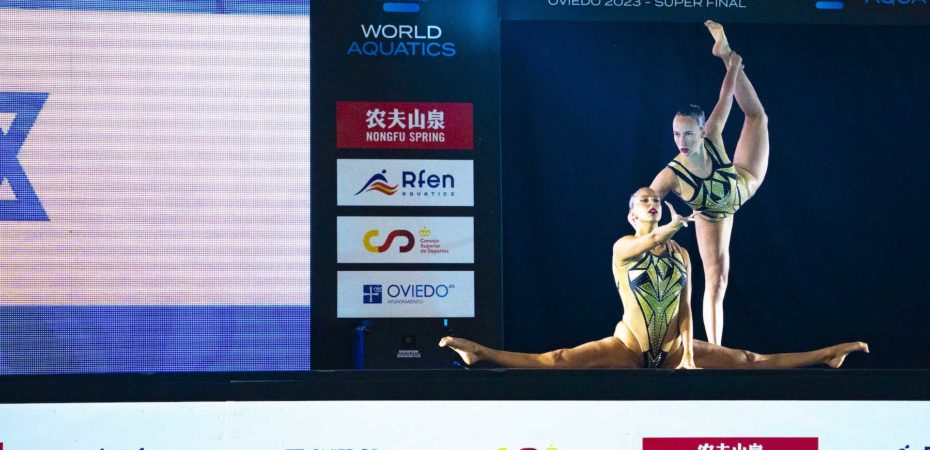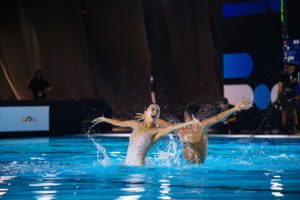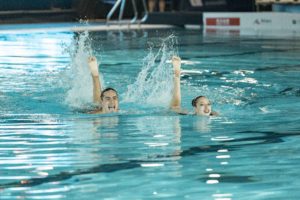The women’s duet events were probably the most interesting and exciting ones at this year’s Super Final, especially for the European pairs. Indeed, in a little over two weeks, they will compete at the European Games and fight for a quota to the 2024 Olympics. In Oviedo, Spain came out on top in the technical duet while Israel won gold in the free event with a huge 36.1 Degree of Difficulty (DD).
In the mixed duets, Spain once again stood at the top of the podium in the technical event. In free, China was unbeatable in its first appearance in this event this season.
WOMEN’S DUETS
Ever since the Montpellier World Cup, the duets from Spain, France and the Netherlands have been quite close in the rankings; all three keeping up with the increases in difficulty all while offering engaging choreographies.
In Oviedo, it seemed the Spanish duet had upped their DD faster than its competitors; a strategy that ultimately paid off. Tokyo Olympians Iris Tio and Alisa Ozhogina earned Spain another gold in the technical duet event with a score of 255.4066, swimming to “Proud Mary” by Tina Turner. The two had the highest declared DD of the field and went from 29.6 in the Soma Bay World Cup to 30.7 in Oviedo.
On paper, France’s Anastasia Bayandina and Eve Planeix had the fifth-highest DD of the field, and admitted they didn’t know if a medal would be possible. But after a strong swim and with the third artistic impression score, the French won the silver medal.
“We were basically starting in fifth,” Planeix said. “So, it’s nice to see that by showing quality in our movements, good execution and consistency, we can still be hopeful about moving up the rankings. We wanted to show everything that we’ve worked on in training, no more, no less. There’s of course still a lot of things to improve, and in terms of sensations we could feel it wasn’t perfect… But we can also see that we are improving from one competition to the next.”
Coach Julie Fabre explained she tried to have her athletes focus on their abilities and what they are capable of, rather than the fact they didn’t have one of the highest DDs that day.
“When I saw everyone’s DD on the start list, I have to admit I felt a bit downhearted,” she said. “So, I really tried to have them focus on the quality of their movements, on their height, and on their performance. We’ve really worked on all of that since Egypt. I am quite happy with what I saw, and how well they connected in the water. Now, we continue on with our strategy, which is not to add a lot of difficulty all at once. Because, I cannot stand when it’s not synchronized or when hybrids are at knee-level. I am glad to see this paid off here. Maybe they wouldn’t have had as good of a swim if we had a higher DD, and we wouldn’t have gotten this result.”
Bayandina and Planeix made their first appearance as a duet in Montpellier before competing again in Soma Bay the following week. This silver marked their first medal in the duet event together. In Oviedo, their “Nature” choreography received a score of 242.4900.
“We have improved a lot since Montpellier,” Bayandina said. “Here, we wanted to keep pushing and really show great height. Now for the European Games and the World Championships, we will perhaps raise our difficulty a little bit more. But for now, Julie’s words are reassuring and make us feel good, so we are happy.”
France is already qualified to the 2024 Olympic Games as the host nation, so these two will head into the European Games a bit more serenely than most.
Maryna and Vladyslava Aleksiiva from Ukraine finished in third in technical duet with a score of 242.0541, having to count a base mark on their acrobatic element. The twins were undoubtedly relieved at this final placement, especially after ranking 19th in Montpellier. They also placed second in the free duet with a score of 217.1771, again counting a base mark but with the highest artistic impression score. They originally had the highest declared DD of 36.30, but were “only” credited 32.85 in the end.
Gold in the free event went to Israel’s Shelly Bobritsky and Ariel Nassee with a score of 225.7915. Thanks to a smart and solid routine construction, they were awarded their full DD of 36.1 for their “New World” routine. This marked an 11-point increase (!) in their DD since their last time out together in Markham in March.
The two were especially fired up for this final after winning gold in the free team the night before.
“We were fighting for this medal,” Bobritsky said. “We were focused, we knew what we had to do. This morning, we woke up and we said, let’s do it and win again. One of the main goal for us was also to see if we could focus in the right places at the right time, and do all the corrections our coaches gave us. Of course, there’s still a long way to go, but we are happy that we were able to get ourselves in this zone.”
The two had already made history for Israel in Markham with a gold in technical duet. Nassee actually hadn’t competed since, missing out on the Montpellier World Cup.
“I was super ill with fever right before Montpellier,” she said. “I couldn’t travel at all. So I was afraid I would not be fully in shape for this competition in Oviedo. But we trained a lot and we were very focused. We wanted this gold medal.”
They also placed fifth in the technical duet event with their “Gypsy Dance” routine and a score of 232.1984. Like most, the Israeli duo is now eyeing the European Games and that Olympic duet quota.
“We will continue increasing the difficulty in both duets,” Bobritsky added. “Everyone in the team, the coaches, the athletes, the staff… We all have the same goal: to bring Israel as high as possible in the rankings. We are happy that we are doing this, making history for Israel. Our work is paying off and it’s amazing.”
Bregje de Brouwer and Marloes Steenbeek from the Netherlands have also been positioning themselves as strong contenders for the Olympic duet quota with consistent and strong performances over their last three outings. They placed fourth in technical duet with a score of 239.9966, and most notably only a mere 2.4934 points behind the silver medalists.
In the free duet, the Dutch won bronze for their “Werewolves” routine. Like everyone, they had increased their DD since their last outing, going from 30.2 in Soma Bay to 32.45 in Oviedo.
“We added even more R7s,” de Brouwer said, laughing. “We are searching for new movements before every competition to get the highest score. Since Egypt, we had a little more time in the Netherlands to change some things, but we really needed to do this. We are happy about this medal. We made progress in every competition this year so that’s good.”
The Spanish duet ultimately scratched from the free events, so fans will have to wait a bit longer to see its new choreography.
One duet that’s steadily and surely making its way up is Portugal’s Maria Goncalves and Cheila Vieira. The two had a very successful outing in Oviedo, placing fifth in free duet with their “Fire Ritual” routine, and sixth in technical duet with their “Rodeo” routine. They had great swims, receiving full credit on both of their routines, and showed great presence and performance in the water.
“To me, a routine with no base marks really feels like winning a medal,” coach Sylvia Hernandez said afterwards, laughing.
MIXED DUETS
Just like its women’s counterpart, Spain’s mixed pair of Emma Garcia and Dennis Gonzalez Boneu won the technical event with a score of 237.6534. It was the first time the two swam together in this event this season. Gonzalez Boneu had actually missed the last two World Cup events with a minor foot injury, and was more than excited to be back out.
“I really wanted to compete again,” he said. “I missed a lot of competitions like Montpellier and Egypt because of my foot. So, I felt bad about that, but now I feel super powerful and happy that I can compete again.”
Gonzalez Boneu paired with Mireia Hernandez in the free event. They performed their “Angels & Demons” routine and received silver with a score of 204.3894.
China’s Shi Haoyu and Cheng Wentao won the free event, scoring 226.3228 with a DD of 35.20. Shi had competed twice in the technical mixed duet this season, once alongside Cheng in Markham, and with Zhang Yiyao in Montpellier. In Oviedo, he and Cheng unveiled their new free choreography to the theme of “Romeo & Juliet.”
“They did good, even though they had a bad practice before so it made me really nervous,” coach Zhang Xiaohuan said. “We talked to them before the competition, and they fixed everything during their performance. They have a very good connection and communicate very well so I trusted them. They are always very determined, quick to react and to adapt.”
Zhang added that it was not until mid-May that it was decided to let Shi and Cheng participate in the Super Final in the free mixed duet. But ultimately, they wanted to test out their new choreography before the World Championships and to ensure both judges and crowd would enjoy the routine.
As for the music, they worked with the team’s musician to obtain a proper arrangement that would fit the theme and what they were looking for.
“I listened to maybe 30 different music about this Romeo & Juliet theme,” Zhang explained. “From movies, theater, classical dance, pop music, opera… In the end I chose these ones. It’s in four different parts and then I asked our musician to work on it. It took us maybe 20 versions to reach this final one. We accelerated the pace, but we really wanted to keep the lyrics for the last part of the routine. I really love this song and atmosphere, and my swimmers like it a lot too.”
Colombia’s experienced pair of Jennifer Cerquera and Gustavo Sanchez won silver in the technical event and bronze in free with scores of 222.2617 and 179.1333, respectively. Just like Sanchez in the men’s solos, these two have won a medal in both mixed duets across all three World Cup legs they participated in this year. They will compete next at the Central American and Caribbean Games held in El Salvador at the end of the month.
Nargiza Bolatova and Eduard Kim from Kazakhstan earned bronze in the technical event with a score of 215.6050 for their “Corpse Bride” routine. Finally, Great Britain’s Beatrice Crass and Ranjuo Tomblin unveiled their free routine choreography in Oviedo. The pair swam to the theme of “Alice in Wonderland” and scored 155.2604. This was the fourth-best score of the competition, but like Tomblin in solo, the duet was not eligible to an official Super Final ranking since it didn’t participate in enough World Cup legs.
Stay tuned for the team recap from the World Cup Super Final, coming out over the next few days. The solos recap is already available here.
ARTICLE BY CHRISTINA MARMET
Cover photo: Omar Rincón-Benzalá / Marilin García (RFEN)
If you’ve enjoyed our coverage, please consider donating to Inside Synchro! Any amount helps us run the site and travel costs to cover meets during the season.



